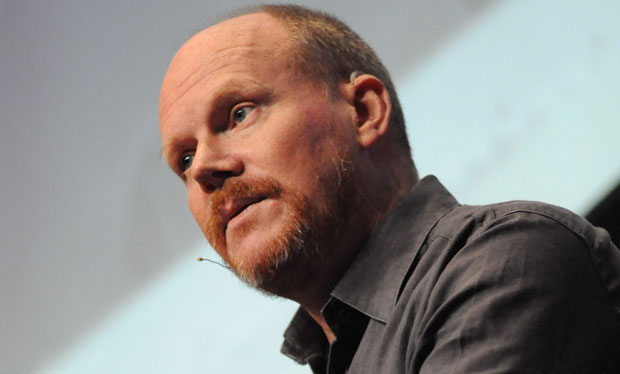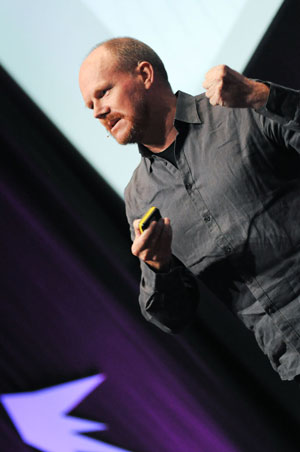
A former Shuttleworth Foundation fellow, Song now runs a company called Village Telco that aims to take mobile telephony to rural areas where operators are often reluctant to deploy infrastructure.
Song grew up in northern Ontario in Canada. His father was South African and, after working in the private sector in London, he eventually came to SA in 1991.
“I got involved by chance with groups working with the Mass Democratic Movement. It was such a tumultuous time and very educational; previously, I hadn’t been very politically aware, but politics pervades everything in SA: you can’t really avoid it,” he says.
Song says his interest in technology had an immediate application in that the early 1990s was when the Internet was transforming from its academic origins into the rapidly growing commercial system it is today. “There seemed to be a huge opportunity for SA, and Africa as a whole, to seize this technology as an enabler for all sorts of things. In many ways that’s what I’ve been doing ever since.”
In the years after arriving in SA, Song became involved with the United Nations’ Information and Communication Technologies for Development programme, which he describes as a “philanthropic approach to try and stimulate the uptake of telecoms infrastructure and the Internet in Africa”. He says this work was eventually “completely overtaken” by the roll-out of mobile networks that were purely commercial and didn’t need developmental assistance.
For Song, the key question for Africa is how to get the bottom end of the market connected and at prices low enough that users can experiment without worrying about costs. “When telecoms becomes cheap enough for people to experiment, they become more creative and innovative and create new enterprises no one’s ever thought of.”
While still in Canada, Song studied cognitive science and artificial intelligence at the University of Toronto but says he has “happily never been gainfully employed in that field”. What it did do, however, was give him a “real interest in the power and limits of technology as a tool for solving problems”.
After a number of years working in Africa — around issues such as increasing Internet access — Song was approached by the Shuttleworth Foundation, established by SA entrepreneur Mark Shuttleworth, and was asked if he was interested in taking up a fellowship.
“It was great,” he says of his time at the foundation, which lasted three years. “The current structure of the foundation, with its entrepreneurial fellowships, is unique. I can’t say enough about how the time I had there has enabled me. I highly recommend it to anyone that has a big idea to pursue.”

During his fellowship, Song says he focused on policy advocacy and technology innovation. The innovation aspect was what led to Village Telco, something Song says he couldn’t have done otherwise. “[The foundation] has a high tolerance for risk. It’s willing to take chances on long shots. There aren’t many places that will back you in that way.”
On the policy side, Song says his biggest success has been raising awareness of the potential of alternative approaches to spectrum management, in particular TV white-spaces spectrum. Some of his suggestions regarding its use now appear in strategic documents of both the department of communications and the Independent Communications Authority of SA.
Song doesn’t like talking about himself much. It’s not that he’s shy or guarded, but rather feels his work says the most about him as it’s also what consumes the bulk of his time. Nevertheless, with a little cajoling he’s willing to talk about some of his other pursuits.
In 1994 — “deep in the mists of time” — he spent six months on a BMW R100GS motorcycle traversing the continent. “It’s arguably one of the best things I’ve done in my life.” What started as a tour of Southern Africa turned into a trip to Kenya and, eventually, to Cairo, at the northern tip of the continent.
“There are waypoints in your life — you finish one thing and are about to start another — where you’re not bound by commitments. It was one of those waypoints.”
Heading up Africa’s east coast on his own, Song eventually met a Czech biker in Nairobi and the pair travelled together to Cairo. “The road to Nairobi was easy, but crossing the Sahara was something that shouldn’t be done alone.”
Song also plays the guitar, but says he doesn’t regard himself as being particularly good at it. “Fortunately, you don’t have to be particularly good at the guitar to get a lot of joy out of it.”
Despite having travelled extensively as a speaker, Song tries to limit the time he spends away from home these days. “I have three small boys now so I try to limit my travel to the essential. I still rarely turn down an opportunity to talk about Village Telco, though. I enjoy talking publicly — it’s an interesting challenge to try and articulate your ideas in an accessible and engaging way.”
 For many in the SA technology industry, Song is of course most famous for his map of the various submarine cables that land in Africa. Song says it was simply a case of the “right thing at right time” and it came about to solve his own problem of visualising the cables.
For many in the SA technology industry, Song is of course most famous for his map of the various submarine cables that land in Africa. Song says it was simply a case of the “right thing at right time” and it came about to solve his own problem of visualising the cables.
“It was really just to keep things straight in my own mind,” he says. “I’m quite graphically challenged; it was just by luck that I hit upon a design for it that seemed visually appealing.”
The map varies the width of the cables depicted according to capacity and has helped change perceptions about connectivity on the continent. “It painted a different picture of a well-connected Africa,” Song explains.
The map is now often used by technology industry executives in their presentations.
With some support from Google Africa, Song is now trying to create a similar map of the continent’s terrestrial fibre.
“I’m trying to do it in a crowd-sourced kind of way so there’s a Wikipedia entry for people to add cable info, and the maps I manage to get go on to Flickr. The challenge is getting operators to cough up the information because it’s not in their genetic make-up to hand out this data.”
He says the newer players like Seacom and Liquid Telecom, however, “understand the power” of releasing information. He says the worst are old, bureaucracy-heavy institutions where sometimes the only way to get information is by creating a scene on public forums like social media.
“In large bureaucracies it’s often safest to do nothing. You can’t do something wrong if you don’t do anything.” — Craig Wilson, TechCentral
- Subscribe to our free daily newsletter
- Follow us on Twitter or on Google+ or on Facebook
- Visit our sister website, SportsCentral (still in beta)




